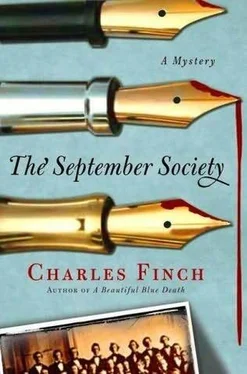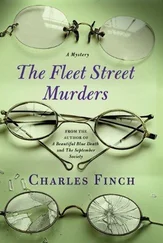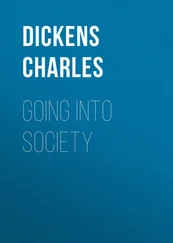Charles Finch - The September Society
Здесь есть возможность читать онлайн «Charles Finch - The September Society» весь текст электронной книги совершенно бесплатно (целиком полную версию без сокращений). В некоторых случаях можно слушать аудио, скачать через торрент в формате fb2 и присутствует краткое содержание. Жанр: Исторический детектив, на английском языке. Описание произведения, (предисловие) а так же отзывы посетителей доступны на портале библиотеки ЛибКат.
- Название:The September Society
- Автор:
- Жанр:
- Год:неизвестен
- ISBN:нет данных
- Рейтинг книги:4 / 5. Голосов: 1
-
Избранное:Добавить в избранное
- Отзывы:
-
Ваша оценка:
- 80
- 1
- 2
- 3
- 4
- 5
The September Society: краткое содержание, описание и аннотация
Предлагаем к чтению аннотацию, описание, краткое содержание или предисловие (зависит от того, что написал сам автор книги «The September Society»). Если вы не нашли необходимую информацию о книге — напишите в комментариях, мы постараемся отыскать её.
The September Society — читать онлайн бесплатно полную книгу (весь текст) целиком
Ниже представлен текст книги, разбитый по страницам. Система сохранения места последней прочитанной страницы, позволяет с удобством читать онлайн бесплатно книгу «The September Society», без необходимости каждый раз заново искать на чём Вы остановились. Поставьте закладку, и сможете в любой момент перейти на страницу, на которой закончили чтение.
Интервал:
Закладка:
“What sort of objects?”
“A tomato, a bit of string, and a fountain pen.”
Dabney scratched at the nape of his neck, where his hair was beginning to come in. “I remember that fountain pen.”
“All three of them were-”
Lenox froze.
“Were?”
“Red,” said Lenox softly, almost as if to himself. “Would you mind if I asked you a question?”
“Of course not.”
“If you’re not bill dabney, who are you?”
CHAPTER FORTY-SEVEN
There was a long, long pause.
Lenox was ambivalent about using guns in his work as a detective-although he loved to hunt-but now his mind kept drifting toward the small pistol in his desk drawer. This stranger was sitting between Lenox and the desk, but he still thought of making a run there. He had a notion of who this fake Dabney actually was, but at the moment he didn’t feel especially confident about his notions. It had taken him long enough to figure out that Dabney was an impostor.
At last the young man said, more curiously than angrily, “How did you know?”
“It was a few things.”
In fact it was three things, each of which had been slightly puzzling: the hair, the ash, and the voice.
“Do you know who I am, then?”
“A friend, I hope.”
“I certainly mean no harm.”
Lenox took a deep, measured breath. He felt the control of the situation was in his hands again, for some reason.
“Are you George Payson?” he asked.
“I am,” said the dead man. He held out his hand. “It’s nice to meet you, Mr. Lenox.”
“Dabney, then? Dead?”
“Yes, Bill’s dead.” Payson’s face remained impassive as he said this. Or perhaps it was a mask of impassivity. There seemed to be a kind of hysteria lurking behind it.
“Did you kill him?”
There was a long, almost frightening silence. Then Payson buried his head in his hands and started sobbing. It was then that Lenox knew he was safe.
“I did in a way. I might as well have,” he said, choking back a sob. Looking up, he asked, “What gave me away?”
It had been the voice, in the end. What Lenox had at first mistaken for an Oxford polish in the lad’s accent had in fact been the tones of a cosmopolitan and aristocratic young man. Then there was the puzzling nature of the second line of ash. As they had been discussing it, Lenox had noticed for the first time how genuinely out of key it was. Why would Payson have made the line of ash in the meadow before Dabney died, when he fully expected to stay there? The only solution was that he had left it as a clue after he had first realized the seriousness of his position-that is, after Dabney’s death.
Then there was the hair. Shorn from the entire body, McConnell had said. Why? Because George Payson’s hair was red. It was too easily identifiable. And then, the decomposition of the body had made reliance upon the corpse’s clothing and accessories for identification necessary…
Lenox explained this. Then he said, “You must have shaved Dabney’s head and body after he died. That’s when you would have seen that you were the real target, and that if you died the heat would subside a little bit.”
“It was the hardest thing I ever had to do. Poor Dabs. He was the greatest, noblest friend you can imagine, Mr. Lenox. When I was pretending to be him last night, everything I said was absolutely true in a strange way. I did tell him he couldn’t come, and he did insist on it. But I had to shave his body. Even knowing that it would nearly kill my mother-have you seen my mother? is she bearing up?-and that his parents would have false hope. But it felt as if I was desecrating him, somehow. It was awful.”
“The decomposition?”
Payson looked at him glassily. “There are always foxes out in the meadow at night. I knew that… trusted in it.” A tear dropped from his eye.
“Perhaps we had better go back to the beginning, then,” said Lenox softly. “Or the middle, at any rate. How did Dabney die?”
“As I said I had. I went into town for food-again as I said. I thought of it as an adventure, not anything we would get hurt over. I was scared, to be certain, but I was excited as well. At any rate. I went into town and came back with food, and I saw the man fleeing through the thicket. He looked behind him, but I could only just see his face.”
“What did he look like?”
“In his forties, probably. He had graying hair, and he wore the kind of suit that always looks like a uniform, if you see what I mean. As if he were a waiter or a valet or something like that.”
“What did you do?”
“I chased him, and then-well, you know what I did as well as I do myself, just as you know why I left the clues. I took his body into the middle of the meadow where there would be a great deal of foot traffic and left behind my little clues.”
The lad sobbed again, trying to hold it back, and strangely enough the genuine sorrow that had convinced Lenox that Bill Dabney was innocent now did the same for George Payson. After the initial shock of realizing the lad was an impostor, Lenox could see the brilliance of what he had done. It was much safer at this moment to be Bill Dabney than George Payson, and how could he have known whether to trust Lenox? Stamp had, but Stamp also hadn’t realized the full implications of Payson’s position.
“Take me farther back. Why is this all happening? Who are these men? What did your father do to them? Who is Geoffrey Canterbury?”
With a deep breath to collect himself, Payson told his tale. “Most of those questions I can’t answer, though some of them I can. That’s one of the reasons I’m so anxious to go to this meeting tomorrow evening. I need to find out the truth myself.
“About two weeks ago I received a strange letter in the post from a man asking to meet me at a pub called the Crown in Didcot, a few miles away. The long walks, as you pointed out-I was counting on somebody thinking it was unusual of me to take a long walk when I put out the stick and the shoes. I do love that walking stick, by the way. My grandfather was a terrific chap.
“It was a cryptic and slightly mad letter, but I had to go for a plain enough reason. It made mention of my father, which I simply couldn’t resist. My father died when I was so young, and people have always reacted so strangely to his name, that for me he holds a talismanic fascination. My shame, my pride-I’m not sure what he is. Perhaps it’s the same way with all men and their fathers.”
“What did the letter say specifically?”
“That the author of it-he called himself Canterbury, as you know, though he readily conceded that it was a false name-had known my father when they served together in India.”
“You went to the meeting, then.”
“Yes. The evening after I received the request.”
“What did he look like?”
“Not really remarkable in any way. He had dark hair, a scar on his throat, and a military posture. As he had in the letter, he seemed slightly mad.”
It was a dead-on description of Lysander except for madness, which might have been feigned. But why warn the lad? Was Lysander playing both sides against the middle? Did he have some old loyalty to James Payson?
“And what did he tell you?”
“He was very mysterious at first, but in the end it came out that he knew of a group called the September Society, a club of my father’s peers from the army, all of whom were leading respectable, quiet lives, and who he said together were some of the most dangerous men in the country.”
“What? How?” Lenox wondered whether this had been hyperbole or fact.
“He refused to say. All night long his refrain seemed to be ’I wish I could tell you that, young Mr. Payson, but I cannot. For your own sake and mine.’ He must have said just those words six or seven times.”
Читать дальшеИнтервал:
Закладка:
Похожие книги на «The September Society»
Представляем Вашему вниманию похожие книги на «The September Society» списком для выбора. Мы отобрали схожую по названию и смыслу литературу в надежде предоставить читателям больше вариантов отыскать новые, интересные, ещё непрочитанные произведения.
Обсуждение, отзывы о книге «The September Society» и просто собственные мнения читателей. Оставьте ваши комментарии, напишите, что Вы думаете о произведении, его смысле или главных героях. Укажите что конкретно понравилось, а что нет, и почему Вы так считаете.












